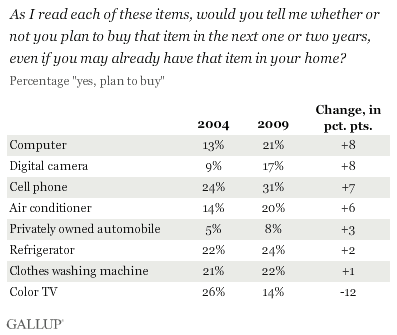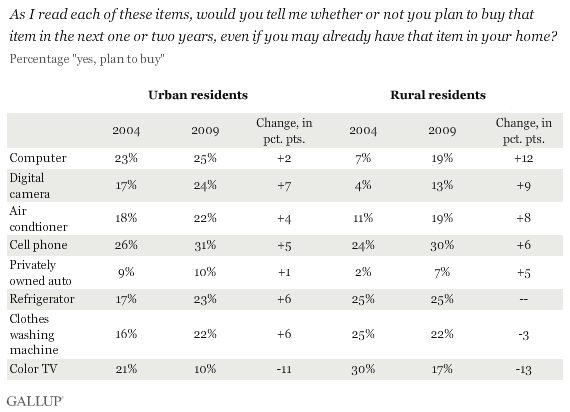BEIJING -- Economists and Chinese leaders for years have worried that China's predominantly export-driven growth is unsustainable, with poverty, the isolation of its rural citizens, and a culture of thriftiness hampering domestic demand. A Gallup survey of Chinese consumers conducted in 2009 suggests this mindset is changing. Chinese intent to buy several items previously considered luxury goods -- including computers, digital cameras, and cell phones -- has increased significantly since 2004.

The increase in demand for computers and cell phones may be a harbinger of future growth attributable to "network effects." In other words, as communication and information technologies become more common among Chinese, they also become more useful to consumers as means of connecting with those around them.
Color televisions are the only items that fewer consumers plan to buy. The market for traditional TVs may be highly saturated at this point; 98% of Chinese in 2009 said they had TVs in their homes, including 97% of those living in rural areas. However, 17% of Chinese said they intend to buy an LCD/plasma TV in the next one to two years.
Demand Growing Among Rural Consumers
Gallup's study last year found demand for some consumer products -- including computers, air conditioners, and privately owned cars -- grew more among rural consumers than among city dwellers. Nearly one in five rural Chinese (19%) said they intended to buy a computer in the next one to two years, up from 7% in 2004. Demand for cell phones rose similarly among rural Chinese and urban Chinese. However, the intent to buy two large household appliances -- refrigerators and clothes washing machines -- changed little among rural residents.

The Chinese government's consumer stimulus programs that particularly focused on rural areas are probably among the chief reasons behind the higher demand for certain consumer products. However, recovering consumer confidence could be another major contributor. A separate Gallup survey of 16 large and small Chinese cities conducted in June 2009 found that most respondents believed the country's economy would be getting better in the next 12 months.
Higher Chinese consumer spending could raise living standards for millions of Chinese, both rural and urban, and give the Chinese economy a source of ongoing momentum. But just as important is the idea that a blossoming domestic market could allow China to become less dependent on exports and therefore less vulnerable to global shocks in the future.
For complete data sets or custom research from the more than 150 countries Gallup continually surveys, please contact SocialandEconomicAnalysis@gallup.com or call 202.715.3030.
Survey Methods
Results are based on face-to-face and telephone interviews with 4,201 adults, aged 15 and older, conducted in September 2009 in China. For results based on the total sample of Chinese adults, one can say with 95% confidence that the maximum margin of sampling error is ±2.2 percentage points. The margin of error reflects the influence of data weighting. In addition to sampling error, question wording and practical difficulties in conducting surveys can introduce error or bias into the findings of public opinion polls.
